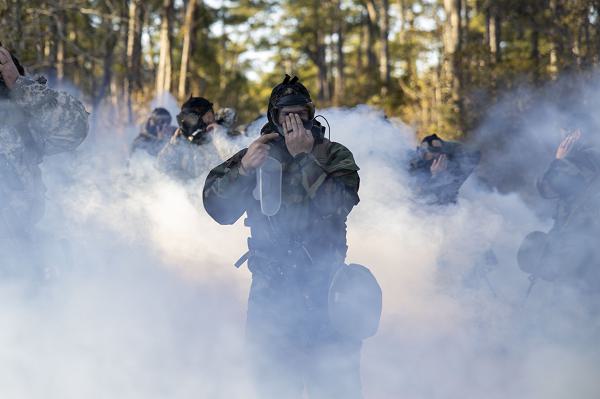
Camp Lejeune, North Carolina. (January 23, 2025): In 256 BC during the siege of the Persian city Dura Europos (modern Syria), Sasanian forces used a mixture of tar and sulfur to gas the enemy. Later, the Athenians resorted to poisoning water supplies with deadly herbs while the Mongols catapulted diseased corpses over the walls of a besieged city. It appears chemical and biological warfare has been a part of combat since ancient times. In this photo by Sergeant Jacquilyn Davis, Marines with II MEF Information Group walk through CS gas during a battalion field exercise. Like their warrior predecessors, the Marines must be ready to confront a wide variety of deadly Chemical, Biological, Radiological, and Nuclear (CBRN) materials.
The first category of CBRN threats involve man-made chemical agents designed to attack the central nervous or respiratory systems. The most common “nerve agent” is Sarin, an odorless gas that causes seizures, paralysis, difficulty breathing, and death. Another category is “blister agents” including Sulfur Mustard Phosgene (Mustard Gas) that causes blindless, lung damage, and death by asphyxiation. Finally, there are “blood agents,” like Cyanide, which deprive the body of oxygen and cause death.
Next comes Biological agents, microorganisms that cause disease in humans and can spawn epidemics. These agents are divided into three categories, Bacteria, Viruses, and Toxins. Examples of bacterial agents include anthrax, botulism, and the plague. Viruses, such as smallpox, Ebola, Marburg, and Dengue Fever can also be weaponized. Finally, man-made poisons like botulinum toxin, ricin, and saxitoxin have also been used to contaminate water and food supplies.
The final category of CBRN agents are Nuclear or radioactive materials converted to terror weapons. These “dirty bombs” are constructed with spent uranium and are designed to cause radiation sickness and death on a wide scale.
America’s military continuously trains to recognize and respond appropriately to these threats that have part of warfare since ancient times.


